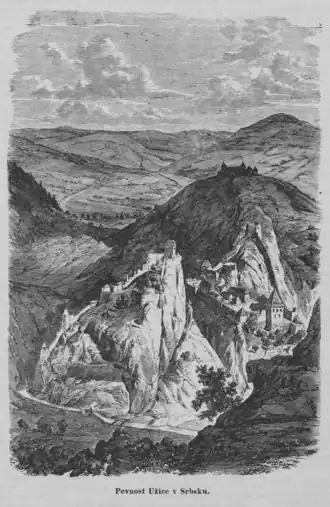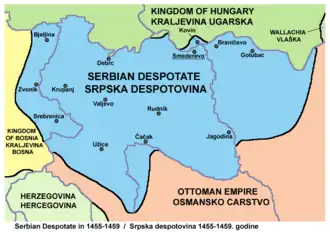Battle of Užice (1458)
| Battle of Tahtalu/Užice | |||||||
|---|---|---|---|---|---|---|---|
| Part of the Hungarian–Ottoman Wars | |||||||
 Uzice Fortress | |||||||
| |||||||
| Belligerents | |||||||
| Ottoman Empire | Kingdom of Hungary | ||||||
| Commanders and leaders | |||||||
|
Mehmed II (strategic coordinator) | Unknown | ||||||
| Strength | |||||||
| Unknown | Unknown | ||||||
| Casualties and losses | |||||||
| Unknown | Most of the army[1][2] | ||||||
The Battle of Tahtalu/Užice was a land battle that took place between the forces of the Ottoman Empire and the Kingdom of Hungary in 1458.[3]
Background

Following turmoil in the Serbian Despotate after the deaths of the Serbian rulers Đurađ Branković on 24 December 1456 and his successor Lazar Branković (who swore allegiance to Mehmed II in 1457) on 20 February 1458, Mehmed decided to send an army under the command of the Grand Vizier Mahmud Pasha to Serbia while he was campaigning in the Peloponnese. Mahmud Pasha added Güzelcehisar, Sivricehisar (Ostrvica), Böğürdelen (Šabac), and Rudnik to Ottoman lands. The Ottoman army would continue its conquests and capture Güvercinlik (Golubac) in mid-August. Mahmud then conducted a raid north of the Danube into the Kingdom of Hungary.[3] Following this, the Grand Vizier came to Skopje and met with Mehmed II, who had returned from his campaign in the Peloponnese.[4]
Battle
During the meeting between Mahmud Pasha and the Sultan, reports were received about a Hungarian army assembling near the Danube to launch an offensive on Ottoman lands.[3] The Hungarians waited until the onset of autumn (when a part of the Ottoman forces would annually disband following the end of the summer campaign season) to launch their offensive, a tactic commonly employed by John Hunyadi.[5] The Pasha and Mehmed the Conqueror ensured that some units were kept under arms instead of being disbanded in case the Hungarian army attacked before winter set in after the Ottomans withdrew.[6]
During autumn, the Hungarian army crossed the Danube near Belgrade and entered Ottoman lands in Serbia.[3] In response, the Sultan instructed the Ottoman troops in the region to hold the various local mountain passes.[2] A contingent of Ottoman troops was ordered to ascertain where the invaders were marching towards.[1] The Hungarians soon marched on the Ottoman castle of Tahtalu (near Drvengrad) in the Mokra Gora - Užice region and began to plunder the surrounding areas.[1]
In the course of their plundering, the Hungarian troops spread out over a large area, not expecting the presence of Ottoman troops in the region.[1] This caused them to lose contact with each other, which enabled the local Ottoman forces to ambush them.[1] The Hungarian army suffered heavy casualties and was forced to retreat back to Hungary.[5][3][1] Following the victory, during which a significant number of Hungarian troops and commanders had been captured as prisoners,[1] the local Ottoman troops were disbanded as was customary.[3] Mehmed and Veli Mahmud Pasha then returned to Edirne in December 1458.[7]
Aftermath
The Battle of Tahtalu, although not a military engagement directly won by the main Ottoman army, was a significant development in the history of the Despotate of Serbia, as it paved the way for the Despotate's annexation by the Ottoman Empire the following year. Since Helena, the Despotess of Serbia and the widow of Lazar Branković, did not want the Orthodox Serbian people to be under the command of Catholic Hungarians, she handed Smederevo Castle to the Ottomans in 1459, bringing the Serbian Despotate to an end.
References
- ^ a b c d e f g Aşıkpaşazade, Ahmed (2003). Yavuz, Kemal (ed.). Osmanoğulları'nın Tarihi [Aşıkpaşazade's History of the Ottomans] (in Turkish). K Kitaplığı. pp. 228–229. ISBN 975-296-043-X.
(translated) Mehmed Pasha had also arrived in Skopje, he met with the Sultan there. There, [some] demanded the army be disbanded, and permitted [to leave]. Mahmud Pasha [in response] said My Sultan! The Hungarian kuffar has stockpiles and is marching towards here. At this time it was reported that the Hungarians were advancing from Belgrade with a large army. Once this news arrived, each sanjak of Anatolian troops was given monetary rewards. The army of Islam was ordered to march to Polava and a part of the troops was ordered to figure out where the kuffars were heading towards. The Padishah himself was preparing to move when the news arrived that the kuffar troops had been spotted. By Allah's Grace, many ghazis were present in Tahtalı. The kuffars were unaware of the presence of these Ghazis. They launched an attack on Tahtalı to pillage it. They spread around, [many] losing contact with each other. In that moment, the ghazis trusted in Allah, said the takbir and attacked towards the great banner of the kuffars. After seeing the soldiers of Islam, the kuffar no longer had the heart to fight. By Allah's grace the kuffar soldiers were slaughtered. The ghazis killed a great many disbelievers, and imprisoned many of their beys and commanders. First the Sultan received the news that the kuffars had been defeated, then their captured banners and their beys and commanders who were taken prisoner were brought before him. Very few of the kuffar soldiers had survived. After this, the majority of the army of Islam were allowed to disband. Mehmed Paşa da Üsküp'e varmıştı; orada hünkarla buluştu. Orada orduya izin vermek, terhis etmek istediler. Mahmud Paşa "Devletli sultanım! Macar kafirinin yığınağı var. Bu tarafa gelmektedir." dedi. Bu sırada Belgrad'dan Macarların büyük bir orduyla ilerlemekte olduğu bildirildi. Bu haber gelince Anadolu askerine sancak sancak harçlıklar verildi. İslam ordusunun Polava'ya gitmesi ve bir miktar askerin de kafirlerin hangi tarafa doğru hareket ettiğini öğrenmesi emrolundu. Padişah da harekete geçmeye hazırlanıyordu ki kafir askerinin göründüğü haberi geldi. Allah yardım etmişti de Tahtalı'da çok sayıda gaziler bulunuyordu. Kafirlerin bu gazilerden haberi yoktu. Kafirler yağmalamak için Tahtalı'ya hücum etti. Etrafa yağma için dağıldılar, birbirleriyle irtibatları koptu. O an gaziler Allah'a sığınıp tekbir getirdiler ve kafirlerin büyük sancağı üzerine hücum ettiler. Kafir orada İslam askerinin bulunduğunu görünce artık savaşma arzusu kalmadı. Kafir askeri Allah'ın yardımıyla kırıldı... Gaziler çok sayıda kafir kırdı, nice büyük beylerini ve komutanlarını esir ettiler. Hünkara önce kâfirlerin kırıldığı haberi geldi, bir iki gün sonra da kafirlerin sancakları ve esir edilen beyleri ve komutanları getirildi. O kafir askerinden pek azı kurtuldu. Daha sonra İslam ordusunun çoğuna izin verildi.
- ^ a b Lütfullah, Müneccim Başı Ahmed (1995). Ağırakça, Ahmed (ed.). Camiü'd-Düvel: Osmanlı Tarihi [The Compendium of Nations: Ottoman History] (in Turkish). İnsan Yayınları. pp. 296–7. ISBN 975-574-034-1.
- ^ a b c d e f Tansel, Selahattin (1953). Osmanlı Kaynaklarına Göre Fatih Sultan Mehmed'in Askerî Faaliyetleri [Mehmed the Conqueror's Political and Military Activity per Ottoman Sources] (in Turkish). Türk Tarih Kurumu. pp. 130–132. ISBN 9789751610812.
{{cite book}}: ISBN / Date incompatibility (help) - ^ Stavrides, Theoharis (2021). The Sultan of Vezirs: The Life and Times of the Ottoman Grand Vezir Mahmud Pasha Angelovic (1453-1474). p. s.123–125.
- ^ a b Setton, Kenneth M. (1989). A History of the Crusades Volume VI. University of Wisconsin Press. pp. 323–325. ISBN 0-299-10740-X.
- ^ Freely, John (2009). The Grand Turk: Sultan Mehmed II. The Overlook Press. ISBN 978-1-590-20449-8.
...but Mahmut Pasha advised him to keep his men under arms because he had learned that the Hungarians were preparing to attack them. News then arrived that a Hungarian force had attacked an Ottoman fortress at Tahtalu, where they were routed by the Turkish defenders. Only then did Mehmet demobilise his army, after which he returned to Edirne to spend the winter at Edirne Sarayı... The fall of Smederova led all the smaller fortresses of northern Serbia to surrender as well. By the end of 1459 all of Serbia was under Mehmet's control
- ^ "MEHMED II". TDV İslâm Ansiklopedisi (in Turkish). Retrieved 2023-09-16.